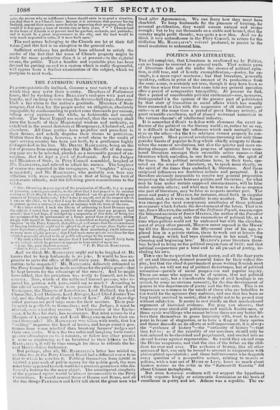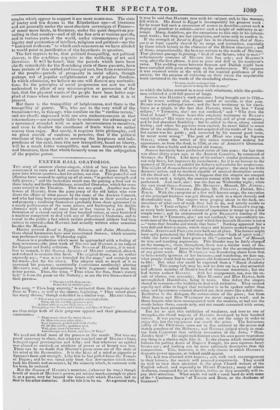POLITICS AND LITERATURE.
THE 01(1 complaint, that Literature is swallowed up by Politics, can no longer be received as a general truth. That certain parts of literature fade and die under the sirocco of political agita- tion, is still true, and of hourly exemplification,—poetry, for ex- ample, it a mere caput mortuum; but that literature, generally speaking, suffers in point of the amount of its productioas from the same 0.11.1S0, is certainly not true, though it may have been so at the time when that cause first came into any general operation after a period of comparative tranquillity. At present we find, that a period of considerable political excitement—one, moreover, distinguished (n the opinion of the greater part of politicians) by that state of transition in social affairs which has usually been connected in ilea with the suspension of all studious pur- suits—is at the same time a period of great literary activity, of great scientific excellence, and of almost universal animation in the various channe's of intellectual industry. THE 01(1 complaint, that Literature is swallowed up by Politics, can no longer be received as a general truth. That certain parts of literature fade and die under the sirocco of political agita- tion, is still true, and of hourly exemplification,—poetry, for ex- ample, it a mere caput mortuum; but that literature, generally speaking, suffers in point of the amount of its productioas from the same 0.11.1S0, is certainly not true, though it may have been so at the time when that cause first came into any general operation after a period of comparative tranquillity. At present we find, that a period of considerable political excitement—one, moreover, distinguished (n the opinion of the greater part of politicians) by that state of transition in social affairs which has usually been connected in ilea with the suspension of all studious pur- suits—is at the same time a period of great literary activity, of great scientific excellence, and of almost universal animation in the various channe's of intellectual industry.
It is somewhat difficult to define with clearness the exact in- fluence of the political on the literary world ; or, rather let us say, it is difficult to defne the influence which each mutually exer- cises on the other—for the t vo relations cannot properly be con- sidered apart. Most political revolutions (meaning not only those grander bursts of popular feeling which chiefly arrogate to them- selves the name of revolutions, but also the quieter and more en. during changes effected by the progress of opinion) have num- bered literature amongst their ostensible active causes — that literature which embodies, in one form or another, the spirit of the times. Such political revolutions have, in their turn, ope- rated on the course of literature, or, to speak more clearly, on the spirit of the times thus embodied by literature. And these
reciprocal influences are doubtless infinite and perpetual. It is therefore obviously impossible to receive any general proposition respecting the relations between politics and literature; for what may be true under certain supposed circumstances, will be false under certain others ; and what may be true in as far as respects one part of literature, may he false as respects another part. The prose anti poetry of MILTON, for instance, stand forth in singular contrast, and, as it were, in hostility to one another. The former was amongst the most conspicuous auxiliaries of those political movements which forbade the development of the latter. That is to say, JOHN MILTON, the author of the DPfensio Populi, was amongst the bitterest enemies of JOH N Mteeces, the author of the Paradise Lost. Plunging early into the commotions of political life, at a time when politics could not be embraced but with the abandon- ment of every other pursuit, Miseoer never reposed in the Muses' lap till the Restoration, in the fifty-second year of his age, re- placed him in a plivate station, there to work out at leisure the grand design which had been slumbering in his mind, "long choosing and beginning late." MILTON'S prose literature there- fore helped to bring on the political conjuncture of 1649; and that political conjuncture put a total end to all pursuit of poetry, in- cluding his own.
These can be no question but that poetry, and all the finer parts of art and literature, demand peaceful times for their widest dis- play, but that the chief departments of prose writing flourish most in periods, we will not say of political disturbance, but of political animation—periods of social progression and popular inquiry. There are some who appear to be of opinion, that not political stagnation only, but a considerable degree of civil bondage is re- quired, by some mysterious necessity, for the due development of genius in the departments of poetry and the fine arts. This is an impression so common in the minds of those who are beholden to the world for the opinions they embrace, and one that has been so long tacitly received in society, that it ought not to be passed over without refutation. It seems to rest chiefly on that much-abused argument of historical evidence. For pray you observe, that whenever your stand-still politicians and mulish finality-men, or those cynic worldlings who cannot believe there are any better fel- lows than themselves to grace humanity with, want to make a point in favour of stagnation, or to have a Tug at their species and throw discredit on its efforts at self-improvement, it is always the " evidence of history "—the "authority of history "—that they fall to; as if the rascality of our ancestors should only be remembered to lie cherished and perpetuated, and erected into an eternal barrier against regeneration. Su would they exceed even
the Divine vengeance, and visit the sins of the father on the chil- dren for ever and ever. The evidence of history, like all other matters of fact, can only be turned to account in conjunction with philosophical speculation ; and those balf-reasoners who despatch every question of a prospective nature, relating to morals or politics, with a text out of HUMS or Ltvv, know us much about human nature as the critic in the "Eatanswill Gazette" did about Chinese metaphysics.
But even hattorical evidence will not support the hypothesis which requires kingly or aristocratic domination as the basis of excellence in poetry and art. Athens was a republic. The ex-
amples which appear to support it ate more numerous. The state of poetry and the drama in the Elizabethan age—of literature and art generally under the most absolute sovereigns of France— of music more lately, in Germany, under the quiet despotism pre- vailing in that country—anti of all the fine arts at various periods, and in various parts of the world, under circumstances of gross bigotry and prostration of intellect, religious and political—are the "historical evidences" to which such reasoners as we have alluded to would point in justification of the hypothesis in question.
The fact appears to be, that political tranquillity, not political slavery, is the condition requisite to the wellbeing of art and literature. It will be found, that the periods which have been chiefly remarkable for the flourishing state of these pursuits, have been periods of this settled and tranquil sort, free from contentions of the people—periods of prosperity in social affairs, though perhaps not of popular enlightenment or of popular freedom. In which admission, we believe no one will discern any contradic- tion; for the principles of social progression are now too well understood to allow of any misconception or perversion of the fact, that the physical wants of the people have been better sup- plied at times when their moral position was not what it is at present. But there is the tranquillity of helplessness, and there is the tranquillity of power. We, who are in the very whiff of the transition—we, in this age, who oscillate on the " cardine rerum," and are chiefly impressed with our own embarrassments in that intermediacy—are naturally liable to underrate the advantages of a movement attended with so much inconvenience to ourselves, and even to disallow the excellence of fruits which we rather convey than enjoy. But surely, it requires little philosophy, and no great stretch of candour, to perceive, that if the political
exertions of this age result in securing the happiness and inde- pendence of the next, then this new tranquillity, based on liberty,
will be a much Letter tranquillity, and more favourable to arts and literature, than that which formerly arose on the subjugation of the popular power.



























 Previous page
Previous page